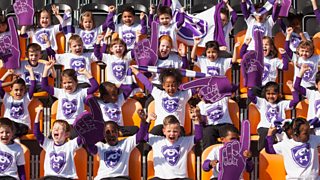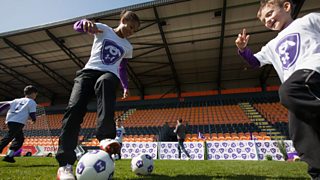
My mother always said that as soon as I could walk I would run around, want to play some sort of game. As soon as I was able to move I did, I just couldn’t sit still. My earliest memory of football is being at primary school where there was a big field out the back with a football pitch. I remember playing there at lunch time with my classmates, and then, outside school, going down to the park and playing football on the street.
We would always play football as it was such an easy, accessible game; all you needed was a ball. You could make a goal out of anything, make sure you knew who was on what team by wearing coloured T-shirts - you didn’t need anything else; so we would play and play, me and the boys. Kids that age don’t really care if you’re a boy or a girl. If you’re a girl and you are good enough then you’re going to get picked, if you are a girl and not good enough then you won’t get picked, and it’s the same for the boys. That’s the simplicity of how kids see things – it is about winning and who will be the best for the team.
When I was eight, the two boys across the road joined the boy’s football club and I tagged along and joined in. I cut my hair short and disguised myself by calling myself Ray! It was easier to pretend to be a boy rather than everyone say, “Oh you’re a girl and shouldn’t be playing football,” - to be a boy and be someone else meant no one questioned what I was doing; it was just about being good enough. At that age I was definitely the same level as the boys, and as I was good enough to be able to play so I joined the football team on the estate.
While I was there though I was stopped from playing in a match - I was asked to leave the pitch in a Final. The manager at the time, who was one of the dads, thought this really unfair as I was good and wanted to play. So at the AGM meeting he spoke to the girls football teams there and got me into a local-ish girls team, Mill Hill United. He organised for me to travel up to training with one of the other players and that’s how I got into girls football: A little bit by luck, due to the generosity of someone really looking out for me, seeing my talent and passion and pushing me forward.
Football for me was something where I could be me and express myself. Most people, especially in this country, are playing it – you don’t need a lot of equipment, you don’t even need to speak the same language as somebody, the game is just understood. You just put the ball down and you play.

I wanted to be the footballers I saw on the TV (but obviously they were all guys back then). I would run round the playground pretending to be Ian Wright – I’d watch him score goals on a Saturday and I would go into school and try to score that goal and do those celebrations. He always played football with a smile on his face and was so passionate, which is so important to a child playing football: When you lose you’re really grumpy, then you score and everything is ok and you’re beaming, then someone else scores and you’re grumpy again! Ian Wright showed all those different emotions and as a child I could really relate to that, I found him very inspiring. That’s what it was about for me as a child, being able to go and re-live what my heroes were doing.
When I left school at 16 to play at Arsenal, I joined the youth training scheme ‘Arsenal in the Community’. This taught us how to coach kids and we’d deliver sessions to local primary schools - I just found it fun. Being a female footballer back in those days wasn’t a career and I wanted to find a job that I could have fun, coaching, passing on my experience as that’s what gave me that special buzz.
The most rewarding thing about working with little ones is seeing someone not being able to do something, then after 10 minutes or even six weeks being able to do something - that sense of achievement is just amazing. Breaking down a skill to help someone learn something - that for me is really fulfilling.
Idid the pilot show for Footy Pups and found it so much fun. The kids are just brilliant. I didn’t understand too much about the animation parts though so I had to learn about that! I think it’s really catchy and I’m pleased to be involved. The focus is indeed football, but I believe that through my life football has taught me so many life skills - how to work in a team, how to be a good loser - those things that all come into everyday life. That’s what is great about Footy Pups, even if those children watching or playing don’t become footballers there are different skills they can take away.
It’s hard for me to pick out one special moment of my career because I’ve been fortunate enough to have so many, which mean different things for different reasons. If there’s a crowd watching and you’ve made people cheer, or you’ve done something that other people would be proud of, those kind of feelings are what it’s really all about.
Rachel Yankey is a professional footballer, who plays for England and Arsenal Ladies, and presenter of CBeebies Footy Pups
